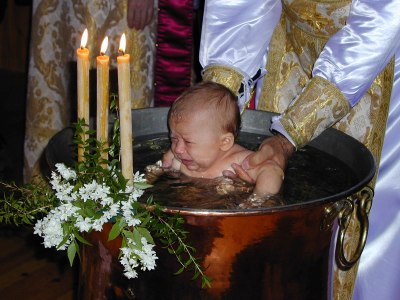|
Listen to this post:
|

“Father, Son, Holy Spirit”? Or “Creator, Redeemer, Sanctifier”? The editors of the flagship magazine of American evangelicalism weigh in here: Blessed Be the Name of the Lord | Christianity Today
While I share the editors’ irritation with politically correct revision of liturgical and theological language, I think their reasoning in this opinion piece is poor. (Read their editorial, then see if you agree.)
- For one thing (paragraph 4), it is not clear that Jesus ever commanded the use of “in the name of the Father, of the Son, and of the Holy Spirit” as a mandatory formula at baptisms. For one thing, as oneness Pentecostals never tire of pointing out, in Acts baptism is apparently done “in the name of Jesus”.
- In my view, a concern with precise words is just not in this passage; the thought in this famous “Great Commission” passage at the end of the Matthew is that the assembly of Jesus is to baptize people on the authority of and on behalf of God, Jesus, and the Holy Spirit.
- Other readers sometimes view this as a baptism into the power and life of those three. It could be both – but words were not the issue. It was a ritual designed to be the start of a whole new quality of life, in a new and better community, in fellowship with God.
- The Christianity Today editors also commit an exegetical fallacy so old, it was stale in Augustine’s time. Imagine this scene:

The excited bride and groom, too hurried for a church wedding, enter the town hall and approach the justice of the peace. After the necessary paperwork, he says to the excited couple, “Jim-Bob and Bertha, I marry you in the name of the mayor of Bugtussle, of the governor of Missouri, and of the President.“
The groom Jim-Bob blurts out “Them guys all have the same name? What is it? Like, Fred? Anyway, I guess that guy is pretty busy with those three jobs.”
The justice of the peace stifles his eye roll, and wishes the new husband and wife a happy honeymoon. “Not my business if kids want to marry too young,” he mumbles.
Again, suppose I pull out a photo album, and say “I’m going to show you a photo of the White House, of the Taj Mahal, and of the Grand Canyon.” That’s a vague sentence – it could mean I’ve got one print with those three famous sights in it. Or (more likely), I just meant that I’m going to show you three photos, one each of those three.
Friends, can we retire this one? Jesus’ famous command uses “name” in the singular does nothing to support or to undercut traditional trinitarian claims.
- But, the mistakes keep a comin’. The editors correctly point out that the new PC-formula (“Creator”, etc.) suggests modalism. But they think the only problem with modalism is that the three modes are not held to be “intrinsic to God’s nature”. Again, they complain that the new PC formulas employ “words of function” – but arguably, “Father” and “Son” can be role- or function-words as well. It seems to me that both “Father” and “Creator” can be used as singular referring terms, similar to names.
- Their last two paragraphs, equally unsatisfying.
- They quote a faulty diagnosis of the liberal mischief by theologian Jenson.
- And then this: we can’t change the language because since he’s revealed it, we should infer that “God is serious about his name” Do they mean that God’s name is “Father, Son, and Holy Spirit”? That doesn’t look like a name – a singular referring term – at least, not in the New Testament, which is what they evidently have in mind here.
- They then raise the specters of “parody” and “idolatry” on the part of the revisionist liberals. Huh?
Sorry, ladies and gents of Christianity Today magazine. This piece can’t even move sympathizers like me, much less those inclined to strike a blow for justice by exorcising male terminology from theology and liturgy.

Pingback: trinities - SCORING THE BURKE – BOWMAN DEBATE – Bowman 2 (DALE)
I am a trinitarian who believes in Jesus Name baptism, because this is scriptural. The Early Church believed and practiced the same thing!
Salvation is by grace through faith in the Lord Jesus Christ ALONE (Jn. 3:16 & Eph. 2:8-9)! Water baptism is ONLY by immersion AFTER one as received salvation. Jesus Name baptism is based solely on Christ’s authority as found in Matthew 28:18. This is the only scriptural basis for this baptismal formula. Besides, the Church is founded on the apostles and prophets with Jesus Christ being the Chief Cornerstone! In reality, there is no trinitarian or oneness baptism. There is only Believer’s baptism according to scripture!
Thanks Dale,
On a side note, I find it utterly intriguing that my church today decided it would start dunking people three times when doing baptisms, once for each of the Trinity.
M
Application of text and exegesis are not the same; exegesis is an examination of the meaning of the text on a purely textual basis, whereas application of text is drawing conclusions for practice from the text. They’re very different. It’s possible that they would think that they’re doing exegesis, but this would just be a misapplication of the word: what they are clearly doing is application, not exegesis. You can’t pull practical conclusions (e.g., that Jesus’s words to the disciples should apply to us) from exegesis alone.
The practical problem, I take it, is the key issue where baptism is concerned: given that baptism was an extremely common phenomenon at the time, and in some places is still fairly common, across very different religious traditions, one’s way of actually doing baptisms needs to be clearly one that identifies it as baptism of this sort rather than of some other sort — and this becomes especially important for a tradition like Christianity, where baptism is the initiatory rite. Thus a practical problem arises: how do you baptize, in a way fitting to Christians, that exhibits, in the clearest and least misleading way, a reasonable fidelity with all the relevant Scriptural texts, and is sustainable as a practice under as wide a variety of situations as possible? And the most practical solution to this problem is pretty much the traditional one. Most longstanding practices in Christian churches are not arbitrary, nor arbitrary misreadings, but highly sustainable solutions to practical problems like this.
Hi Mark,
Your “biggest problem” isn’t so big. They can just repeat that the works of the Trinity “ad extra” are indivisible, so all three would be implicated in all three actions, it’s just that in *some* sense, the one person is that somehow moreso, or more fundamentally. So, if you think all three created, perhaps in some sense the plan of creation originated in the Father but not the others.
As to your second comment, note that my suggested reading makes sense of the passage. Further, we don’t need to appeal to intuitions about what 1st c. Jews surely would’ve thought – the very sentence specifies who this is done in the name of – of the Father, of the Son, and of the H.S..
Brandon,
To clarify the point about Oneness folk – I think they’re all wet in their idea that baptisms are invalid unless done “in Jesus’ name”. My point was that neither the author of Matthew nor Luke is concerned with liturgical detail. I agree that in Acts he’s merely describing the Baptism – which one? The one in Jesus’ name. I don’t understand the “practical problem” you mention.
I don’t understand your point re: the exegetical fallacy. It seems to me that they take themselves to be doing exegesis. I agree that “Father” etc. are generally used as names. But so might “Creator” etc.
“valid” vs. “real”. Yeah, as evangelicals, I don’t think they’re much concerned with the former, quasi-political issue.
For one thing (paragraph 4), it is not clear that Jesus ever commanded the use of “in the name of the Father, of the Son, and of the Holy Spirit” as mandatory formula at baptisms. For one thing, as oneness Pentecostals never tire of pointing out, in Acts baptism is apparently done “in the name of Jesus”.
This strikes me as a somewhat weak argument in itself. The oneness Pentecostal interpretation has never been exegetically plausible; in at least one of the uses of “baptism in the name of Jesus” in Acts the latter part of the phrase is pretty clearly simply a descriptive phrase to distinguish it from “John’s baptism”; and elsewhere it is easily read in much the same way, to distinguish it from alternative forms of baptism (which were very common). It is not so clear that the standard formula in Matthew can be read as merely a distinguishing phrase. But even if it were, it would still raise the practical problem of how you could possibly baptize in the name of the Father, the Son, and the Holy Spirit, and clearly convey that you are doing that rather than something else, without saying that that was, in fact, what you were doing.
I also think in your arguments you are forgetting that the article is not defending Trinitarian baptism, but criticizing one way of doing Trinitarian baptism in light of the standard understanding of what one is trying to do in Trinitarian baptism. Thus there is no exegetical fallacy in the Name discussion; it’s not an exegesis but an application of text. ‘Father’ and ‘Son’ are not, in fact, standardly understood to be words of function; Jenson’s diagnosis is not so obviously faulty in that light; etc.
The real problem with the article is that it confuses valid baptism with real baptism. Whether a baptism is real or genuine depends on whether God makes it so. Whether a baptism is valid depends on whether the rest of the Church can clearly recognize it as real.
Surely the biggest problem with “Creator, Redeemer Sanctifier” is that the Son and Spirit are involved in Creation (plus likewise for the other two) as much as the Father.
I disagree that “Jesus’ famous command uses “name” in the singular does nothing to support or undercut traditional trinitarian claims.” I think that for Jews of the day it would be fairly obvious that “the name” could only have been YHWH (just as Jesus in the letters is given “the name above every name”) and also that if you were going to include anyone else in a sentence with that name you’d better have a darned good reason.
Comments are closed.